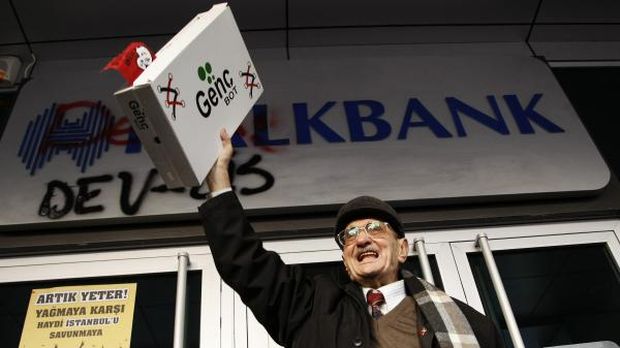
A Turkish secular protester holds a shoe box in front of a branch of Halkbank, during an anti-government demonstration to refer the bribery money which was found by police in the house of Halkbank’s general manager in police operation to tender fraud and bribery, in Istanbul, Turkey, 21 December 2013 (EPA/ULAS YUNUS TOSUN)
Istanbul, Reuters—Halkbank’s dealings with sanctions-hit Iran are entirely lawful, the Turkish state-run lender said on Monday after its chief executive was arrested in a corruption probe denounced by Prime Minister Tayyip Erdoğan as a foreign plot.
Halkbank’s Iranian business ties had drawn Western disapproval amid US-led efforts to curb Tehran’s disputed nuclear programme. Erdoğan described the police crackdown on the bank and a wider investigation last week as a foreign-engineered “dirty operation” against him.
Turkey has bought natural gas and oil from Iran through an indirect system whereby Iranian exporters received payment in Halkbank lira accounts and used that money to buy gold. The bulk of that gold was then been shipped from Turkey to Dubai, where Iran could import it or sell it for foreign currency.
In a filing with the Istanbul stock exchange, Halkbank said it had complied with the law in its business with Iran.
“There was no domestic or international rule or ban that prevented the sale of precious metals to Iran up until July 1, 2013,” the bank said in a statement, adding that it had stopped such transactions as of June 10.
Halkbank had also been processing a portion of India’s payments for Iranian oil.
“The source of the funds used in these transactions and the parties to this trade are open, transparent and traceable in the system,” it said in the statement.
Halkbank Chief Executive Suleyman Aslan and the sons of two cabinet ministers are in custody in connection with the corruption inquiry. Erdogan responded by sacking or reassigning some 70 police officers, including the head of Istanbul’s force.
The scandal has exposed a growing rift between Erdoğan and Fethullah Gülen, a US-based Muslim cleric with influence among the police and judiciary. It has also fuelled anti-government protests and shaken the strong Turkish economy that helped keep Erdoğan in power.
